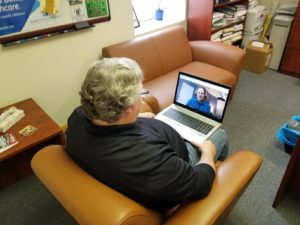Tips For Quitting
Guest Blogger: Holly Hobert, BSN, RN, CTTS
Quitting tobacco is the single best thing you can do to improve your health. Quitting smoking at any age can lead to positive health outcomes. YOU DESERVE TO QUIT!
Get Help! People are more successful when they get help quitting. Both Myers and Belington Clinics have a Certified Tobacco Treatment Specialist on staff, which includes myself and Kim Jeffries, RN, CTTS. We have specialized training, which provides us better understanding of how to help you Quit.
It’s Not Just A Matter Of Will Power! Nicotine is as addictive as heroin or cocaine. Smoking increases the number of nicotine receptors in your brain. When you stop smoking, those receptors continue to expect nicotine. The adjustment process, is what causes cravings and withdrawal. We can recommend which medications may be right for you. Some medications are over the counter and some are by prescription. All of our providers advocate and support tobacco cessation. 
Multiple Quit Attempts Get You Closer To The Finish Line! It doesn’t matter if you’ve tried many times and not been successful. Each Quit attempt gets you closer to quitting for good. The average person takes an average of 8 – 11 attempts to quit. It doesn’t matter if you’ve smoked for 1 year or 40 years, you can still benefit from quitting.
Build Your Quit Plan
- Pick a Quit Date — Sooner is better than later. Choose the date carefully. This is a Big Step and huge decision. Circle the date on the calendar.
- Let Those Close To You Know You’re Quitting — Quitting is easier with support from important people in your life.
- Get Rid of Smoking/Tobacco Reminders — For Quit day, get rid of all cigarettes, tobacco, e-cigarettes, matches, lighters, ashtrays. Don’t keep a back-up for “just in case”. Clean out your home and car to rid the smell, as this can trigger a craving.
- Identify Your Reasons for Quitting — As you prepare to Quit, think about your reasons for quitting and remind yourself of them every day. They will inspire you to quit for good. Write them down and hang them up in a prominent place, such as the refrigerator or bathroom mirror.
- Identify Your Triggers — Make a list of everything that makes you feel like smoking or chewing and include ways to deal with these or avoid these triggers.
6. Develop Coping Strategies — When you quit tobacco, smoking or e-cigarettes, your body has to adjust to no longer having nicotine. This is called withdrawal, which is unpleasant, but you can get through it. Medications and behavior changes can help you manage symptoms of withdrawal. Make sure to have medications on hand prior to your quit date. Remember, cravings will lessen with every day that you stay quit.
For more details on How to manage cravings, check out this site.
7. Hang in There — The first few weeks of quitting are the hardest. You will deal with uncomfortable feelings, temptations, withdrawal symptoms, and cravings. Plan on using multiple support options such as mobile apps, WV Tobacco Quit Line: 1-800-QUIT-NOW. Remember we are here for you, want to support you and can walk you through the quit process.
8. Reward Yourself — Reward yourself throughout the process. Each minute, hour and day you have been quit is progress toward your goal. Give yourself a reward at 24 hours, one week, and one month quit. Be proud of your accomplishments. Consider putting the money you would have used for tobacco in a jar and use this for the reward fund.
Medicare Made Simple: Your Guide to Understanding Healthcare
Medicare Made Simple: Your Guide to Understanding Healthcare Navigating the complexity of Medicare can be a lot. In this blog, we will break down
Barbour Community Project Assists Patients
Barbour Community Project Assists Patients It’s no secret that Barbour County is a close-knit community that Barbour Community Health Association (BCHA) is proud to
Healthy Eating Habits for Toddlers with Rachel Williams, MS
Healthy Eating Habits for Toddlers with Rachel Williams, MS As your baby becomes a toddler, he or she may begin to display some very

